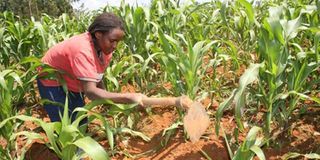Growing biotech maize close to reality

Ms Agnes Wanjiro weeds her maize crop at Yamumbi in Eldoret in 2011. Experts believe growing genetically modified maize will increase yields realised by farmers. PHOTO | JARED NYATAYA | NATION MEDIA GROUP
What you need to know:
- Scientists request to be allowed to release genetically modified maize variety.
Kenya has taken a key step towards allowing the growing of genetically modified crops on open farms.
The biotechnology regulator is reviewing a request by scientists seeking the environmental release of a maize variety developed at the Kenya Agricultural and Livestock Organisation (Kalro).
The Bt maize, the scientists believe, is resistant to the stem borer, the notorious insect pest blamed for cutting maize production by 13 per cent or 400,000 tonnes in Kenya every year.
The submission of the 200-page document to the National Biosafety Authority (NBA) marked the latest crucial step in a journey that has seen scientists put in hours looking into microscopes and petri dishes in Kalro’s laboratories for the super gene, tending seedlings in greenhouses and conducting field trials in the hot Kiboko sun since 2007.
The regulator is expected to pore over the document and rigorously assess the product. It must be ascertained that any changes in its genetic make-up will make it resistant to stem borer and that it is safe for human consumption, cannot harm the environment and has significant economic benefits.
“The biosafety authority has to determine, among other things, that it looks like maize and tastes like maize,” says Francis Nang’ayo, a senior manager for regulatory affairs at AATF, which negotiates access to affordable technology by African farmers.
Dr Willy Tonui, the biosafety authority chief executive, says the NBA is confident of delivering on its biggest assignment since its establishment in 2009.
But opponents of biotech crops under the Kenya Biodiversity Coalition said it would submit its own document to the authority rejecting the Bt maize.
UNANSWERED QUESTIONS
The coalition’s coordinator, Ms Anne Maina, said they were unhappy because the authority had withheld information.
“There are too many unanswered questions with regard of Bt maize to hazard their open field cultivation,” said Dr Peter Mokaya, board secretary and director of a lobby, Organic Consumers Alliance.
He said genetic contamination will occur and that the availability of various varieties will diminish with significant threat to biodiversity.
“Maize is cross pollinated. This means that pollen (male seed) may be brought from another plant, field or farm to the plant.”
The biosafety authority board, which will make the final decision, includes representatives of the Kenya Plant Health Inspectorate Services, the National Environment Authority, the National Commission for Science, Technology and Innovation, the Department of Veterinary Services and the Kenya Bureau of Standards.
The regulator also has the option of sounding out independent experts and hopes to infuse as many diverse opinions as possible, having recently invited public views.
This will take three to five months.
Experts believe biotechnology has the potential to increase food production and say it will solve food problems in poor countries, especially in Africa.
They have likened it to the tractor and fertiliser revolution that handed ordinary farmers in Europe and North America an escape route from rural poverty in the early 20th Century, or the Asian Green Revolution of the 1960s and 1970s that helped to avert a famine in India and weaned it off food aid, with the availability of high-yielding rice and wheat.
Norman Borlaug, the eminent American agricultural scientist credited with orchestrating the Asian Revolution and former US President Jimmy Carter warn of the possibility of Africa missing the biotechnology revolution in the preface to Robert Paarlberg’s book, Starved for Science.
“This would be tragic, since Africa, with the largest proportion of its population engaged in agriculture, has the most to gain from biotechnologies that protect crops from disease and insects, increase yield stability under drought, enhance nutritional quality and lower production costs,” say the two Nobel Peace Prize winners.
The Kenyan government sees biotechnology as a critical cog in efforts to achieve food self sufficiency outlined in the Vision 2030 economic blueprint that targets a middle-income economy status in the next 15 years.
Last week, Deputy President William Ruto announced that the government could remove the ban it imposed on biotech foods in 2012. In addition to Bt maize, the biosafety authority has received another application for the environmental release of Bt cotton, a variety believed to be resistant to the bollworm and developed at Kalro. Other crops under various stages of laboratory and field research in Kenya are sorghum, cassava and a drought-tolerant maize.
South Africa approved the Bt maize last year. With at least 2.9 million hectares of land under genetically modified crops, South Africa is a leader in biotech food globally. Eighty-six per cent of maize, 92 per cent of soybean and 100 per cent of cotton grown in the country is genetically modified.
Dr Nang’ayo says 70 pages of their document address food safety alone, citing the common fears and myths. Beyond the science, they hope their public-private partnership approach to reduce the high costs associated with biotechnology will also earn the application a kind evaluation by the NBA team.
If the authority ends up agreeing with Dr Nang’ayo, this could as well be the dawn of the African Green Revolution.





